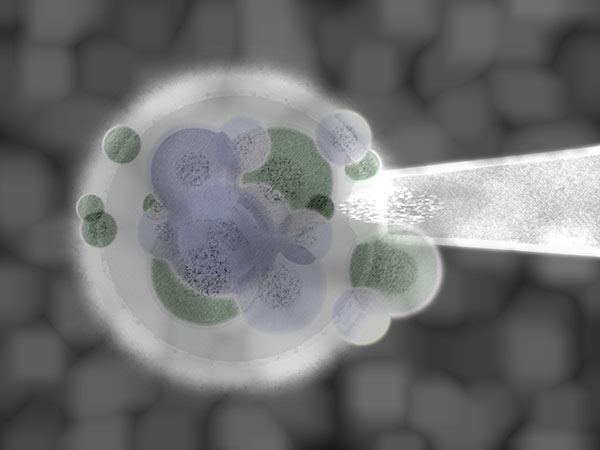Preimplantation Genetic Screening (PGS)
This critical study gives future parents peace of mind that their offspring will not have genetic diseases from studying the embryos before their transfer to the mother’s uterus.

What is the PGS?
Preimplantation genetic screening (PGS) allows chromosomal evaluation, with diagnostic precision, of embryos obtained before a highly complex treatment. The procedure involves the biopsy of one or more cells from the embryo, the following genetic analysis of the cells obtained, and then the transfer of embryos whose results were typical for the abnormalities sought.
The presence of these diseases is analyzed in the DNA of the eggs or embryos to select those that meet specific characteristics and discard those with genetic alterations.
Why is this test performed?
Chromosomal alterations affect the number or structures of chromosomes, and with this technique, other causative alterations can be detected, including Turner and Down syndromes.
However, it is not possible for technical reasons to study all the chromosomes, so this type of study focuses on analyzing the chromosomes that have the highest incidence of abortions in the general population. Alterations in chromosomes 13, 14, 15, 16, 18, 21, 22, X, and Y account for 70% of the abortions described for which they are those studied in PGS.
Between 0.6 and 6% of newborns present abnormalities in the karyotype: translocations or aneuploidies. And 60% of spontaneous abortions show chromosomal alterations. Hence the great importance of PGS.
Who should consider this test?
Some variables in human reproduction are associated with a greater risk of transmitting chromosomal abnormalities to offspring, such as advanced age, recurrent miscarriage, severe male factor, and implantation failure. In these cases, it is recommended to genetically study the embryos using PGS to select the most optimal ones and those with the best possibility for implantation.
It is estimated that 10% of spermatozoa and 20% of oocytes are aneuploid. And between 20 and 40% of in vitro embryos are genetically abnormal, according to scientific studies. The most recent studies even raise this figure to 50%.
There are also people who, despite alterations in their chromosomes, have balanced translocations with a normal phenotype, meaning they do not suffer from any disease.
But this raises the proportion of aneuploids among their embryos to 95% due to abnormal segregations during meiosis.
How is this test done?
The PGS study process is carried out as follows:
The woman must undergo hormonal treatment to stimulate ovulation. The eggs are then retrieved under anesthesia, and the man’s sperm is obtained using a semen sample. In the laboratory, the fertilization of the ovules is carried out.
By analyzing the cultured embryo cells, the constitution of the chromosomes is then evaluated, and the healthy ones are differentiated from the sick ones. According to the opinion of the doctors who carry out these processes, the possibility of achieving pregnancy increases by transferring healthy embryos.
After making a small hole in the membrane in the embryo phase, one of the cells is selected with a pipette, which is aspirated for later analysis. After about two days, the transfer to the uterus of the best embryos is carried out. If excess embryos are not defective, they are frozen for another cycle if a pregnancy is not achieved.
Sources:
Advantages of PGS | It is relevant to understand what the pros and cons are of PGS.
Inser is the pioneer fertility institute in this study throughout the country. To learn more about this study, contact us on our lines.
If you need more information about this treatment.
Contact us in our lines:
- Medellín: +57(4) 268 80 00
- Bogotá: +57(1) 746 98 69
- Cartagena: +57(5) 693 04 34
- Pereira: +57(6) 340 17 09
- Whatsapp: +57 316 3033866




